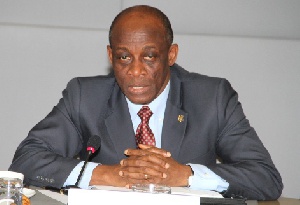- Home - News
- TWI News | TV
- Polls
- Year In Review
- News Archive
- Crime & Punishment
- Politics
- Regional
- Editorial
- Health
- Ghanaians Abroad
- Tabloid
- Africa
- Religion
- Election 2020
- Coronavirus
- News Videos | TV
- Photo Archives
- News Headlines
- Press Release
Business News of Thursday, 2 July 2015
Source: kasapafmonline.com
IMF To Ghana: Eliminate tax exemptions
The International Monetary Fund (IMF) has recommended to the Ghanaian government the need to completely eliminate tax exemptions it grants to individuals, firms, and institutions wanting to do business with the country to improve revenue performance over the medium term.
It further urged the West African country to do more to enhance its tax administration.
The pronouncement was made Tuesday after a team from the IMF led by Joël Toujas-Bernaté concluded discussions with Ghanaian officials on the first review of the country’s financial and economic program that lasted for twelve days (June 17-30, 2015).
Among the Ghanaian officials present were; President Mahama; Finance Minister Seth Terkper; Bank of Ghana Governor Kofi Wampah; Dr. Kwesi Botchwey, Chairman of the National Development Planning Commission; the Finance Committee of the Parliament, other senior officials, representatives of civil society and the donor community.
Ghana is currently enjoying a three-year arrangement under the Extended Credit Facility (ECF) of the Bretton Woods institution in an amount equivalent to $918 million to support its financial and economic program.
The ECF is a lending arrangement that provides sustained program engagement over the medium to long term in case of protracted balance of payments problems.
Ghana is reported to lose millions of cedis in tax exemptions annually, a situation according to financial experts if halted, would address some imbalances in its tax administration system.
In 2014, tax exemptions accounted for about 3.3 percent of Gross Domestic Product (GDP) about GH¢ 3.2 billion, against GH¢ 2.95 billion recorded in 2013, according to a Daily Graphic report.
This huge amount has sparked public debate with many calling for a review in the way the government grants tax exemptions to individuals and institutions it does business with.
A Tax Policy Advisor at the Ministry of Finance, Dr. Edward Larbi-Siaw, at a stakeholders’ meeting on the 2015-2017 budget statement assured that the financial policy of the government would aim at cutting down the exemptions to 2.4 percent in the medium term.
“We are supposed to cut down exemptions on few things we don’t tax. Presently, the exemptions are said to be about 3.3 percent of GDP, but the aim is to cut down to 2.4 per cent in the medium term,” he was quoted as saying.
The 2013 Budget Statement captured the country’s tax exemption expenditure at about 3.28 per cent of GDP with an estimated $876 million also going down the drain due to direct tax and VAT exemptions in 2012.
However, the IMF believes that a complete elimination of tax exemptions by the West African country is the best way to go to improve upon its revenue performance over the medium term.
The directive forms part of the Mission’s condition to Ghana in accessing its Extended Credit Facility.
The IMF in October 2014 reiterated the call after concluding similar discussions with Ghanaian officials.











